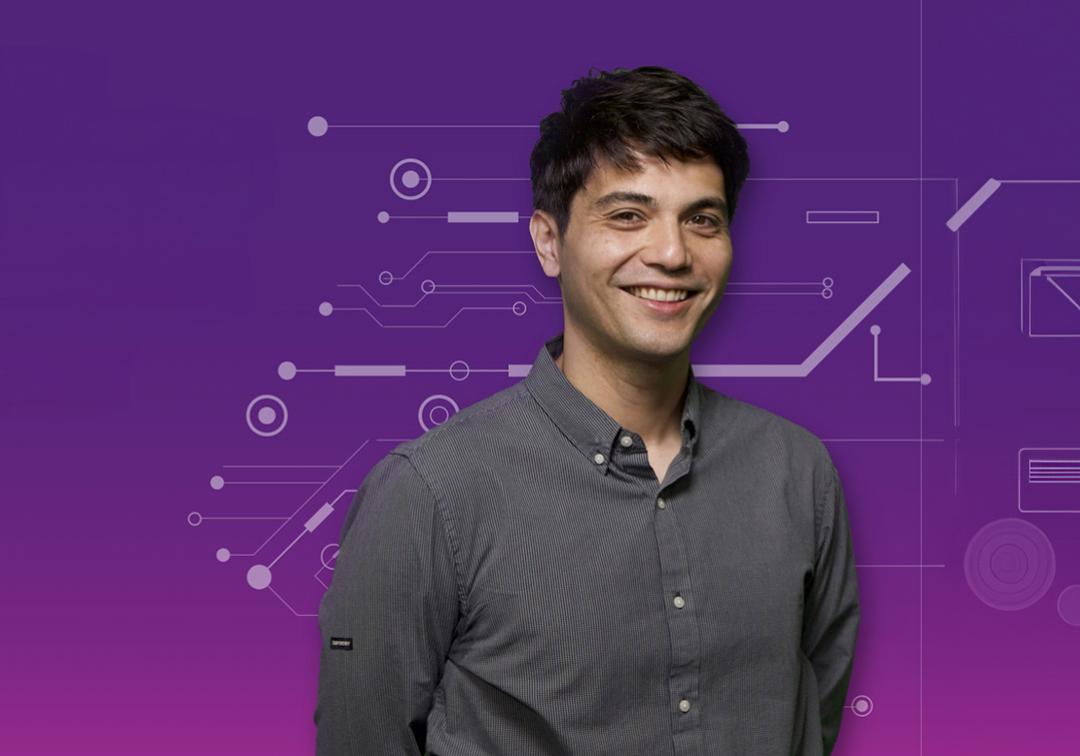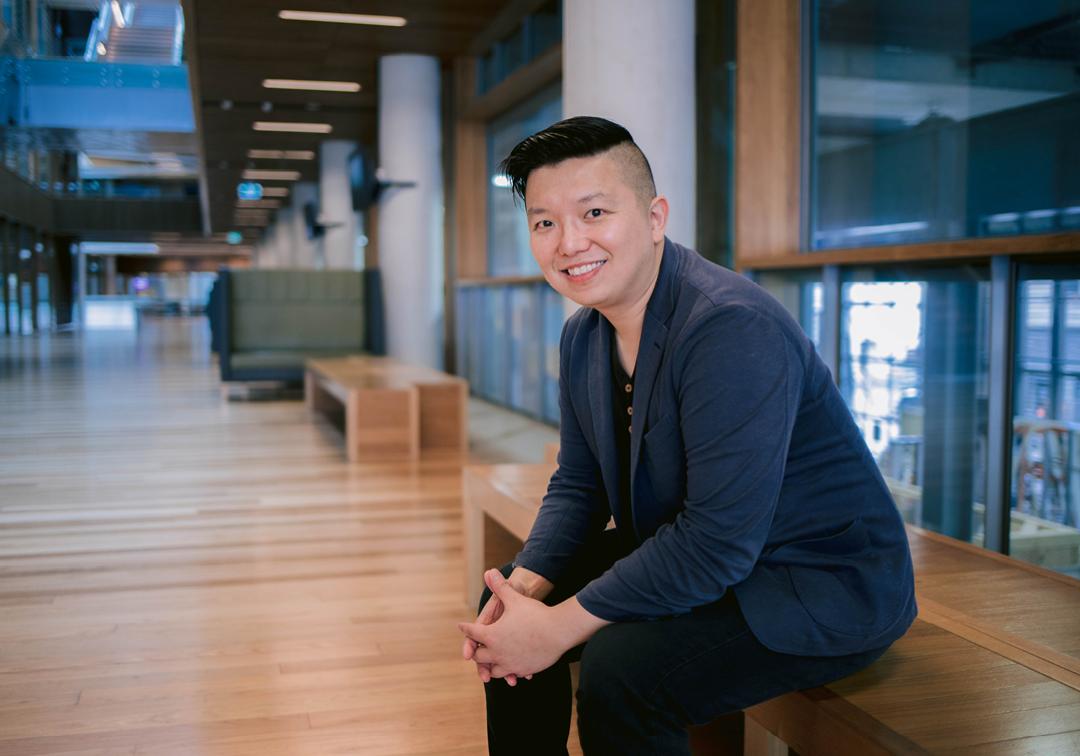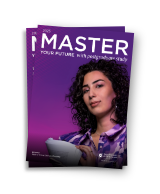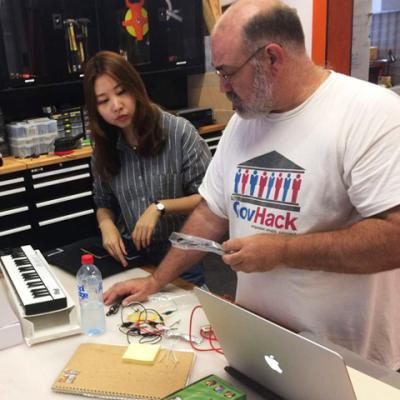
Graduate Diploma in Interaction Design
Overview
Interaction designers play a vital role in creating digital products that are useable, uncomplicated, and human-centred. If you're looking to develop advanced knowledge about the design process for interactive products – this is the program for you.
Our professional program for graduates from other fields, to allow you to learn the essential skills to work in the interaction design industry.
You will have a degree in a field other than Interaction Design / User Experience Design / Multimedia Design, and you will take a year of study to develop technical skills in-depth.
Your future is in industry, as an interaction designer. You will undertake foundational studies to allow you to achieve a transition to become an interaction designer.
Meet the challenges of tomorrow
Interaction with electronic devices is a major part of our daily lives. From early childhood onwards we are connected to the internet, telecommunications and networks of computer-based technologies. The emerging challenges in this radically evolving field are not so much with the nature of new technologies, but with their design. How should these technologies be experienced in our lives? How can they support and enhance our everyday practices? What should they help us become? These programs train students to address these issues through the design of new interactive technologies.
Program highlights
- Interaction design professionals work in multidisciplinary teams to address open-ended, real-life design projects. Your program simulates this environment through studio-based and project courses.
- Students from the course Physical Computing and Interaction Design Studio get to demonstrate their work to peers and industry at our annual student design exhibition.
- Benefit from a program that offers a flexible study plan. Choose from a large number of elective courses and tailor your studies to suit your interests, your industry, or your career goals.
Interaction Design Exhibit: Soundscape
How you'll learn
Your learning experiences are designed to best suit the learning outcomes of the courses you choose.
- Lectures
- Tutorials
- Research experience
- Laboratory work
- Studios
What you'll study
At UQ, degrees are called 'programs' and subjects are called 'courses'. Here's a sample of the courses you could study in this program:
- Design Thinking
- Digital Prototyping
- Human-Computer Interaction
- Social and Mobile Computing
Career possibilities
Postgraduate study can take you anywhere. Here are some of the careers you could be on your way to:
- User experience designer
- Multimedia designer
- Interaction designer
Average annual salary range
User Experience Designer
seek.com.au
Next steps after graduation
Graduates of the Graduate Diploma of Interaction Design have advanced understanding of usability problems and how to solve them. They also have diverse skills relevant to a range of industries, sectors and discipline areas.
Graduates typically work across the public and private sectors. Employers include technology companies, banking and financial services, digital agencies, media companies, government agencies, and health providers.
Stories
See all stories
UQ people
Meet the expert: exploring computer science with Dr Paul Vrbik
3-minute read

UQ people
What's it like to do a PhD in artificial intelligence?
4-minute read

UQ people
Meet the expert: exploring cyber security with Professor Ryan Ko
3-minute read
Stories
See all stories
UQ people
Meet the expert: exploring computer science with Dr Paul Vrbik
3-minute read

UQ people
Meet JoJo, an Environmental Management student from China
5-minute

UQ people
What's it like to do a PhD in artificial intelligence?
4-minute read
Entry requirements
Entry requirements
To be eligible for entry, you'll need:
- a bachelor's degree (or equivalent) in a field other than interaction design, multimedia design, human computer interaction or user experience design, or
- to have completed post-secondary studies in a field other than interaction design, multimedia design, human computer interaction or user experience design and 2 years full-time equivalent relevant work experience (see below). Applications based on post-secondary study and/or work experience will be individually assessed.
You must have a grade point average (GPA) of 4.5 on a 7-point scale in your previous qualification.
- a bachelor's degree (or equivalent) in a field other than interaction design, multimedia design, human computer interaction or user experience design, or
- to have completed post-secondary studies in a field other than interaction design, multimedia design, human computer interaction or user experience design and 2 years full-time equivalent relevant work experience (see below). Applications based on post-secondary study and/or work experience will be individually assessed.
You must have a grade point average (GPA) of 4.5 on a 7-point scale in your previous qualification.
Relevant work experience
Relevant work experience includes a minimum of two years' work in a professional, knowledge-based or information-oriented workplace. This may include work in administration, business, customer support, finance, government, human resources, law, marketing, operations/project management, strategy and sustainability. This will need to be supported with evidence.
Evidence of relevant work experience should include a letter from your employer (and/or previous employers) clearly stating the following:
- That you work (or worked) within the specified organisation
- The nature of your work, detailing any relevant duties and responsibilities to the entry criteria above
- The length of time you were in your role/s (i.e demonstrating minimum length for entry) and whether this was full-time, part-time, or casual
- Any further bespoke conditions listed by the entry criteria
Letters will typically be expected to be presented on company letterhead and signed by a manager or HR representative. A CV or resume is not a sufficient document on its own, and must be accompanied by a supporting letter as described above.
All applications based on work experience are subject to an individual assessment.
Entry into a program through work experience does not necessarily provide a pathway into further study in a Masters.
Related programs
Depending on your previous qualifications and current goals, you might want to consider
one of these related programs:
English language requirements
IELTS overall 6.5; reading 6; writing 6; speaking 6; listening 6. For other English Language Proficiency Tests and Scores approved for UQ
TOEFL iBT (including Paper Edition) - Overall 87, listening 19, reading 19, writing 21 and speaking 19.
PTE Academic - Overall Score of 64 and 60 in all sub bands.
BE - A minimum overall grade of 4 plus a minimum grade of C in all macro skills.
CES - Overall 176 and 169 in all sub bands.
OET is not accepted.
There are other ways to meet the English language requirements. For some programs, additional conditions apply.
Student visas
International students who are accepted into full-time study in the Graduate Diploma in Interaction Design are eligible to apply for an Australian student visa (subclass 500).
There are a number of requirements you must satisfy before a visa is granted, including the Genuine Student (GS) requirement.
Fees and Scholarships
Indicative annual fee
Approximate yearly cost of tuition (16 units). Your fees will vary according to your selected courses and study load. Fees are reviewed each year and may increase.
$8,948
2024
$8,948
2024
Approximate yearly cost of full-time tuition (16 units). Your fees will vary according to your study load. Fees are reviewed each year and may increase.
AUD $51,200
2024
AUD $51,200
2024
Government assistance
Financial aid
As an international student, you might be eligible for financial aid – either from your home country, or from the Australian Government.
HECS-HELP
Domestic places in the Graduate Diploma in Interaction Design are Commonwealth Supported. This means the cost of your education is shared between you and the Australian Government.
Instead of tuition fees, Commonwealth Supported students pay what are called student contribution amounts.
HECS-HELP is an Australian Government loan scheme to assist eligible students with the cost of their student contribution amounts.
Centrelink support
The Australian Government offers a number of income-support payments to eligible Australian university students.
Scholarships
You may be eligible for more than 100 scholarships, including:
How to apply
Applying online
All international applications should be submitted to UQ. If you prefer, you can use an approved UQ agent in your country.
The program code for the Graduate Diploma in Interaction Design is 5370.
Find out more about applying for postgraduate coursework study
Applying online
All domestic applications should be submitted to UQ.
The program code for the Graduate Diploma in Interaction Design is 5370.
Find out more about applying for postgraduate coursework study
Important dates
The closing date for this program is:
- To commence study in semester 2 - May 31 of the year of commencement.
- To commence study in semester 1 - November 30 of the previous year.
To learn more about UQ dates, including semester start dates, view the Academic Calendar.
Important dates
The closing date for this program is:
- To commence study in Semester 1 - January 31 of the year of commencement.
- To commence study in Semester 2 - June 30 of the year of commencement.
To learn more about UQ dates, including semester start dates, view the Academic Calendar.
Aboriginal and Torres Strait Islander applicants
For support with applying – or if you have any questions about university life – get in touch with our Aboriginal and Torres Strait Islander Studies Unit.
Explore other programs
Express yourself. And your interest.
They say choosing a degree is hard, which is why we've made it easy. Register your interest and we'll send you everything you need to know about applying to UQ.


